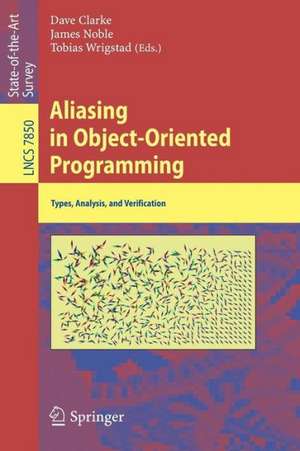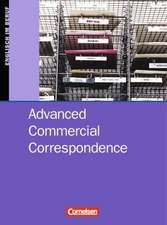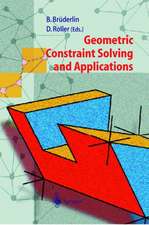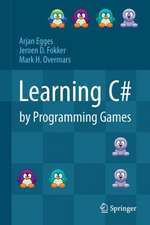Aliasing in Object-Oriented Programming: Types, Analysis and Verification: Lecture Notes in Computer Science, cartea 7850
Editat de David Clarke, Tobias Wrigstad, James Nobleen Limba Engleză Paperback – 26 mar 2013
Din seria Lecture Notes in Computer Science
- 20%
 Preț: 1061.55 lei
Preț: 1061.55 lei - 20%
 Preț: 307.71 lei
Preț: 307.71 lei - 20%
 Preț: 438.69 lei
Preț: 438.69 lei - 20%
 Preț: 579.30 lei
Preț: 579.30 lei -
 Preț: 410.88 lei
Preț: 410.88 lei - 17%
 Preț: 427.22 lei
Preț: 427.22 lei - 20%
 Preț: 596.46 lei
Preț: 596.46 lei - 15%
 Preț: 448.04 lei
Preț: 448.04 lei - 20%
 Preț: 353.50 lei
Preț: 353.50 lei -
 Preț: 389.49 lei
Preț: 389.49 lei - 20%
 Preț: 309.90 lei
Preț: 309.90 lei - 20%
 Preț: 645.28 lei
Preț: 645.28 lei - 20%
 Preț: 763.23 lei
Preț: 763.23 lei - 15%
 Preț: 580.46 lei
Preț: 580.46 lei - 20%
 Preț: 310.28 lei
Preț: 310.28 lei - 20%
 Preț: 655.02 lei
Preț: 655.02 lei - 20%
 Preț: 1183.14 lei
Preț: 1183.14 lei - 20%
 Preț: 340.32 lei
Preț: 340.32 lei -
 Preț: 449.57 lei
Preț: 449.57 lei - 20%
 Preț: 591.51 lei
Preț: 591.51 lei - 18%
 Preț: 938.83 lei
Preț: 938.83 lei - 20%
 Preț: 337.00 lei
Preț: 337.00 lei - 20%
 Preț: 649.50 lei
Preț: 649.50 lei - 20%
 Preț: 607.40 lei
Preț: 607.40 lei - 20%
 Preț: 1414.79 lei
Preț: 1414.79 lei - 20%
 Preț: 1024.44 lei
Preț: 1024.44 lei - 20%
 Preț: 583.40 lei
Preț: 583.40 lei - 20%
 Preț: 453.32 lei
Preț: 453.32 lei - 20%
 Preț: 575.49 lei
Preț: 575.49 lei - 20%
 Preț: 1075.26 lei
Preț: 1075.26 lei - 20%
 Preț: 585.88 lei
Preț: 585.88 lei - 20%
 Preț: 825.93 lei
Preț: 825.93 lei - 17%
 Preț: 360.20 lei
Preț: 360.20 lei - 20%
 Preț: 763.23 lei
Preț: 763.23 lei - 20%
 Preț: 340.32 lei
Preț: 340.32 lei - 20%
 Preț: 504.58 lei
Preț: 504.58 lei - 20%
 Preț: 369.13 lei
Preț: 369.13 lei - 20%
 Preț: 580.93 lei
Preț: 580.93 lei - 20%
 Preț: 343.62 lei
Preț: 343.62 lei - 20%
 Preț: 350.21 lei
Preț: 350.21 lei - 20%
 Preț: 583.40 lei
Preț: 583.40 lei - 20%
 Preț: 583.40 lei
Preț: 583.40 lei - 15%
 Preț: 438.59 lei
Preț: 438.59 lei - 20%
 Preț: 341.95 lei
Preț: 341.95 lei - 20%
 Preț: 238.01 lei
Preț: 238.01 lei - 20%
 Preț: 538.30 lei
Preț: 538.30 lei
Preț: 343.62 lei
Preț vechi: 429.52 lei
-20% Nou
Puncte Express: 515
Preț estimativ în valută:
65.76€ • 71.41$ • 55.24£
65.76€ • 71.41$ • 55.24£
Carte tipărită la comandă
Livrare economică 22 aprilie-06 mai
Preluare comenzi: 021 569.72.76
Specificații
ISBN-13: 9783642369452
ISBN-10: 3642369456
Pagini: 524
Ilustrații: VIII, 515 p. 134 illus.
Dimensiuni: 155 x 235 x 28 mm
Greutate: 0.73 kg
Ediția:2013
Editura: Springer Berlin, Heidelberg
Colecția Springer
Seriile Lecture Notes in Computer Science, Programming and Software Engineering
Locul publicării:Berlin, Heidelberg, Germany
ISBN-10: 3642369456
Pagini: 524
Ilustrații: VIII, 515 p. 134 illus.
Dimensiuni: 155 x 235 x 28 mm
Greutate: 0.73 kg
Ediția:2013
Editura: Springer Berlin, Heidelberg
Colecția Springer
Seriile Lecture Notes in Computer Science, Programming and Software Engineering
Locul publicării:Berlin, Heidelberg, Germany
Public țintă
ResearchCuprins
Beyond the Geneva Convention on the Treatment of Object Aliasing.- The Geneva Convention on the Treatment of Object Aliasing.- Ownership Types: A Survey.- Notions of Aliasing and Ownership.- Understanding Ownership Types with Dependent Types.- Object Graphs with Ownership Domains: An Empirical Study.- Alias Control for Deterministic Parallelism.- Alias Analysis for Object-Oriented Programs.- Immutability.- Fractional Permissions.- Object Ownership in Program Verification.- State Based Encapsulation for Modular Reasoning about Behavior-Preserving Refactorings.- Separation Logic for Object-Oriented Programming.- VeriFast for Java: A Tutorial.- Confined Roles and Decapsulation in Object Teams — Contradiction or Synergy.- Location Types for Safe Programming with Near and Far References.- TheFuture of Aliasing in Parallel Programming.- Aliasing Visions: Ownership and Location.- Alias Analysis: Beyond the Code.- How, Then, Should We Program.- A Retrospective on Aliasing Type Systems: 2012-2022.- Structured Aliasing.
The Geneva Convention on the Treatment of Object Aliasing.- Ownership Types: A Survey.- Notions of Aliasing and Ownership.- Understanding Ownership Types with Dependent Types.- Object Graphs with Ownership Domains: An Empirical Study.- Alias Control for Deterministic Parallelism.- Alias Analysis for Object-Oriented Programs.- Immutability.- Fractional Permissions.- Object Ownership in Program Verification.- State Based Encapsulation for Modular Reasoning about Behavior-Preserving Refactorings.- Separation Logic for Object-OrientedProgramming.- VeriFast for Java: A Tutorial.- Confined Roles and Decapsulation in Object Teams — Contradiction or Synergy.- Location Types for Safe Programming with Near and Far References.- The Future of Aliasing in Parallel Programming.- Aliasing Visions: Ownership and Location.- Alias Analysis: Beyond the Code.- How, Then, Should We Program.- A Retrospective on Aliasing Type Systems: 2012-2022.- Structured Aliasing.
The Geneva Convention on the Treatment of Object Aliasing.- Ownership Types: A Survey.- Notions of Aliasing and Ownership.- Understanding Ownership Types with Dependent Types.- Object Graphs with Ownership Domains: An Empirical Study.- Alias Control for Deterministic Parallelism.- Alias Analysis for Object-Oriented Programs.- Immutability.- Fractional Permissions.- Object Ownership in Program Verification.- State Based Encapsulation for Modular Reasoning about Behavior-Preserving Refactorings.- Separation Logic for Object-OrientedProgramming.- VeriFast for Java: A Tutorial.- Confined Roles and Decapsulation in Object Teams — Contradiction or Synergy.- Location Types for Safe Programming with Near and Far References.- The Future of Aliasing in Parallel Programming.- Aliasing Visions: Ownership and Location.- Alias Analysis: Beyond the Code.- How, Then, Should We Program.- A Retrospective on Aliasing Type Systems: 2012-2022.- Structured Aliasing.
Textul de pe ultima copertă
This book presents a survey of the state-of-the-art on techniques for dealing with aliasing in object-oriented programming. It marks the 20th anniversary of the paper The Geneva Convention On The Treatment of Object Aliasing by John Hogg, Doug Lea, Alan Wills, Dennis de Champeaux and Richard Holt. The 22 revised papers were carefully reviewed to ensure the highest quality.The contributions are organized in topical sections on the Geneva convention, ownership, concurrency, alias analysis, controlling effects, verification, programming languages, and visions.
Caracteristici
High quality selected papers Unique visibility State of the art research




